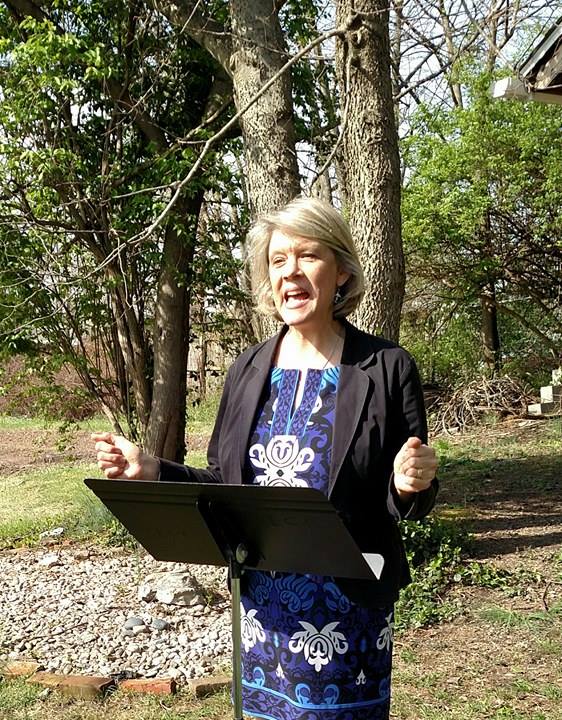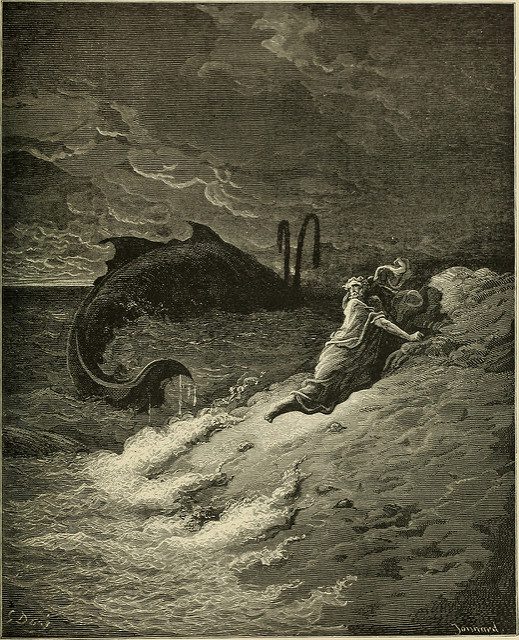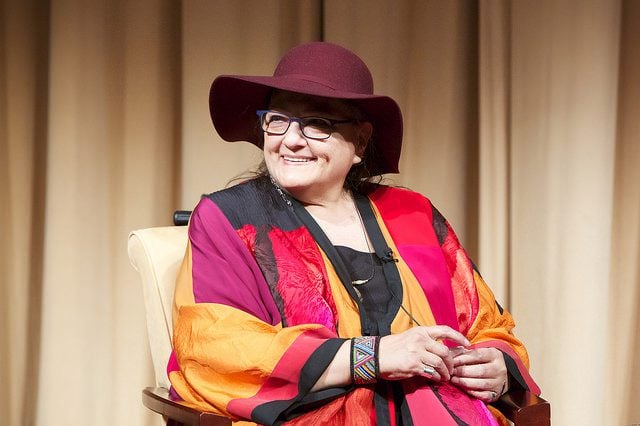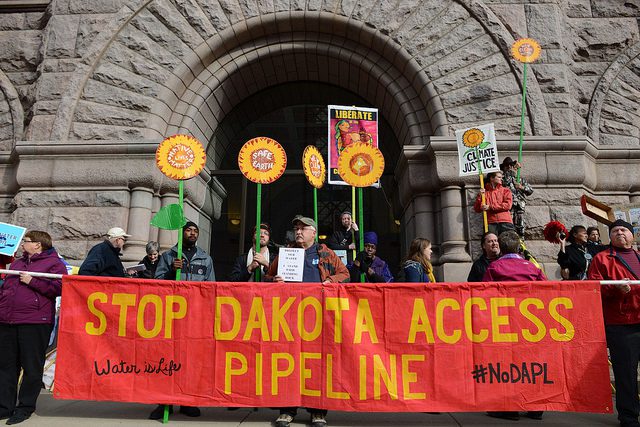Carol L. Devine is the Senior Minister of Providence Christian Church (Disciples of Christ) in Lexington, KY, and the second-place winner of the 2017 EcoPreacher Earth Day Sermon Contest. Carol is also the Minister of Green Chalice, part of the Mission and Advocacy ministry of the Disciples of Christ.

This sermon was preached on April 2, 2017, at at the community garden space at Transylvania University, Lexington, KY, for an Earth Day Worship Service. One of the many strengths of this sermon is the way Carol applies an eco-hermeneutic to scripture, giving us a “green lens” through which to view the story of Jonah and the Ninevites. She then shows us how their world and our own not only share many similarities, but are both desperately in need of God’s mercy – especially as we face the impending catastrophes associated with climate change.
Carol will receive a signed copy of my book, Creation-Crisis Preaching: Ecology, Theology, and the Pulpit (Chalice Press, 2015).
Living in Ninevah
Copyright, Carol L. Devine, 2017
Text: Jonah 3-4.2
Poor Jonah! His name is not remembered among other great prophets like Isaiah or Jeremiah or Elijah. He is not held up as a model for how to follow God. You don’t come upon statues of Jonah next to fish ponds or even by the seashore. Bless his heart, the only reason he is remembered at all is because his story includes a great big fish, and the whole idea of being swallowed by a whale makes memorable children’s books with beautiful illustrations.
You remember Jonah’s story.
God called him to go to the sinful city of Nineveh to tell them to repent. Jonah said, “Ain’t no way I am going to help save those wretched people.” And so he took off – got on a boat to sail the ocean blue to freedom. But then a powerful storm came up and it looked like they were all going to die.
The captain said to Jonah, “Pray to your God!” And Jonah had to confess that the storm was his fault because he was running from God. The Captain was not thrilled to hear this piece of news and asked what they needed to do to. Jonah responded with the only selfless act of the entire story. He said, “Throw me overboard so that you can live.” With some hesitation, they threw him into the sea and they were indeed saved.

In fact, Jonah’s vain efforts to refuse God’s call and his bad attitude about the whole mission – including the success he ended up having – has earned him a reputation among some people for being crabby and ridiculous. We have all assumed that he hated the idea that God could care about Gentiles.
But maybe there is more to the story….
Nineveh is just southwest of what is now the city of Mosel, Iraq, just across the Tigris River. Nineveh was one of the oldest and greatest cities in ancient times. Its beginning dates back to 6,000 years before Christ. It was a pagan religious center, a trade center and the capital of Israel’s greatest enemy, Assyria.
Jonah does not tell us much about Nineveh but the Prophet Nahum does. He tells us that their primary sin was War. It was a city of bloodshed which murdered a lot of people and enslaved entire nations (Nahum 3:1). Nahum also says that they “increased the merchants more than the stars of heaven” (Nahum 3:16). It seems the people of Nineveh were most concerned with making money. Because of their violence and greed, when Nineveh is mentioned in the Bible, it is never with affection or compassion.
Saving Nineveh?
So, Nineveh’s deliverance – from Jonah’s perspective – would mean that this sinful city would “live to fight another day,” so to speak. Nineveh would be able to continue to kill and enslave, build wealth and ignore the least of these. Preserving this place and these people could mean that Israel would fight them again at some point in the near future. From his experience, from his knowledge, and from his gut intuition – saving Nineveh was a very bad idea.
As a matter of fact – and unfortunately – Jonah was right! Less than 20 years after he died, in 722 BC, the northern kingdom of Israel was utterly destroyed by the Assyrians. And for a long time after that, Judah and Jerusalem were firmly under the thumb of Assyria as its vassal. So God’s mercy for Nineveh did come at a terrible cost to Israel.
Looking back from our point in history, Jonah’s strong desire to NOT go to Nineveh makes a lot of sense. Jonah knew that God’s mercy is greater and more powerful than God’s justice. And mercy for Nineveh would one day spell destruction, death, and deportation for Jonah’s home and for Jonah’s people. Jonah did not want mercy; he wanted justice!
Saving the U.S.?

Jonah’s story in today’s context in the U.S. might be like God calling Suzan Shown Harjo to warn this country of impending doom. Suzan is a Cheyenne and Muscogee Native American Leader who has dedicated her life to advocating for Native American rights.
We can imagine that God might say:
Suzan, the United States is a sinful nation, full of violence and evil. Go to Washington D.C., the center and power of this great nation, and tell the people to turn away from their wickedness and repent. Their greed is desecrating sacred native lands, causing global temperatures to rise, the polar ice caps to melt, and severe weather to destroy lives. My people are dying! Suzan, tell Congress and the President, tell the Supreme Court and all the people who call themselves Americans to change their ways and I will show them mercy.
Suzan might consider this kind of response:
Hmmm, well God – these people that you want to save committed genocide against my people. They continue to seize, loot, dig up, and build on top of our cemeteries and sacred sites without our permission. These people you want to save make a mockery of my people by using our images as mascots, naming a national sports team “Redskins,” and singing chants that denigrate us. They have made over 500 treaties with Indigenous tribes and have changed, nullified or broken all of them. These people you want me to save care more about making money than caring for your good earth and the least of these. I do not want to go to D.C. I do not want to save these sinful and rebellious people.
Do you see? We are living in Nineveh.
Jonah did not want to save those people. Likewise, Suzan and other Native Americans understandably would not want to save us. They can see the writing on the wall – these sinful people will not change! But unlike Jonah, Suzan has not run away from her charge. She is one of the leading Native American activists in the United States, raising public awareness about issues of concern to Native Americans by working on legislation to protect their rights, preserve their languages and traditions, reduce their high levels of poverty, alcoholism and unemployment, and safeguard their sacred lands. [Read more at http://biography.yourdictionary.com/suzan-shown-harjo#oFsqYvJxizPpjxdr.99.]
It has always baffled me that Jesus identified himself with Jonah (Matthew 12:40).
But there are a lot of similarities. Jonah was in the belly of the fish for 3 days and Jesus was dead in the tomb for 3 days. Jonah journeyed through the wilderness of Nineveh for 40 days and Jesus was tempted in the wilderness for 40 days. And like Jonah, who was one of the few prophets sent to speak to nations beyond Israel, Jesus also saved Gentiles.
Maybe the best insight for why Jesus identified with Jonah was when he prayed in the garden of Gethsemane the night he was betrayed. You remember how after the Last Supper with the Disciples, Jesus went outside to pray. Scripture says that Jesus was grieved and agitated as he went to pray and that he fell on his face and prayed, “If it is possible, let this cup pass from me,” (Matthew 26:39-42).
Jesus was fully human and his divinity did not get him a pass from suffering and pain; he did not get a pass from the struggles and feelings that we also experience. Perhaps Jesus felt like Jonah, at least sometimes, as he taught and preached the people, especially the Jewish leadership. Perhaps like Jonah, Jesus knew that everybody would NOT repent and change – that most people would continue to choose making money over caring for the least of these, including Creation. He knew the nations would continue to go to war, to kill and to enslave God’s people.
But thankfully, Jesus was not like Jonah in the most important way.
He did not run from the mission that God gave him. In fact, he faced his mission to save us all with compassion and love, grace and joy.
Thankfully, God’s justice contains a whole lot of grace, because today – we are Ninevites. We live in Nineveh and we need God’s grace and mercy as much today as the people in Jonah’s time. Thankfully, God is merciful and slow to anger. We are the nation continuously at war – participating in killing God’s people. Our nation participates in the multi-billion dollar industry of slavery. This country is much more concerned with making money than caring for the earth or our neighbors.
Recently President Trump put the construction of the Dakota Pipeline on the fast track, going against the pleas of Native Americans who say the pipeline threatens their religious rights and their water supply. And he has rolled back many U.S. climate policies, making it much harder for us to meet our obligations to the Paris-agreement.
So, yes, we live in Nineveh and we are Ninevites.
But what if … we are also all called to be Jonah?

What if God is calling me and you – each of us – to God’s work; to a mission that probably does not jibe with our desires, with our plans, and with our goals? What if God is calling us – urging us, pulling us, speaking to us?
To stand with our indigenous brothers and sisters and to help protect their land, their culture and their dignity.
Learn about issues that are important to Native Americans who have been oppressed since the first Europeans arrived to the Americas.
Listen to First Peoples who have much to teach us about caring for God’s good Earth.
Like Jonah we may be hesitant, even resistant, to even trying to do the work and save the Ninevites. We may feel like saying: it won’t work, they won’t listen, they won’t change, it is a waste of my breath. But our small actions combined with God’s power will, like Jonah, cause the people and “even animals” to repent (Jonah 3:8). Even the King of Nineveh put on a sackcloth and sat on an ash heap.
Our efforts are needed now more than ever because we are already seeing change…
The Solar and Wind energy industry is growing faster than anyone could have predicted and is cheaper today that ever.
Airborne coal pollution was killing 14,000 people a year in 2010, but today that number has been reduced to 7,000.
Apple, Walmart and Google all announced that they will stick with the established climate goals.
Native American issues are better known today than ever before – from Standing Rock to Sports team mascots, we are taking a stand and making a change.
The word of the Lord came – and is coming still – to all of us Jonahs:
“Get up, go to Nineveh, that great city, and proclaim to it the message that I tell you.”
So let’s get up and go!
To see the first-place winner of the 2017 EcoPreacher Earth Day contest, click here.
Looking for more ideas for “green” sermons, or examples of EcoPreacher sermons? Check out these links:
17 Ways to be an EcoPreacher and Help Heal Our Planet
Why I’m Not Just Preaching About Earth on Earth Day
Falling Off the Bike: A Sermon for Earth Day
Leah D. Schade is the author of the book Creation-CrisisPreaching: Ecology, Theology, and the Pulpit (Chalice Press, 2015).
You can follow Leah on Twitter at @LeahSchade, and on Facebook at https://www.facebook.com/LeahDSchade/.

















